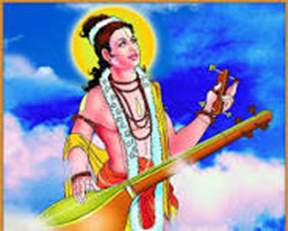Sutras 7 to 14
Sutra 7
Sa na kamayamana, nirodha-rupatvaat.
That bhakthi (Parama Prema) is not in the form of desire (kama);
it is in the form of renunciation (nirodha).
Sutra 8
Nirodhastu loka veda vyapara nyasaha.
Now, this renunciation is for the worldly activities and Vedic rituals.
Parama Prema Bhakthi is marked by supreme love that is free from all physical and emotional desires. Rather it is marked by renunciation, renunciation of the whole ego-based personality, which is the home of all physical and emotional desires. Nirodha is renouncing that which is an obstacle to the goal. This is further explained in next Sutra as renunciation of worldly activities, and Vedic rituals which are done for specific purposes. For in the Parama Prema Bhakthi, one’s mind is focused exclusively on God and is fully immersed in the love of God. In this total surrender to God, there is no room for any distractions that will take the mind away from the love of God. This all-consuming love of God is exemplified in the love of Gopies for Lord Krishna in Brindavan. The explanation is continued in the next Sutra as well
Sutra 9
Tasmin ananyata tadvirodhishu udasinata cha.
In this
(renunciation) there is total unification (ananyata) and indifference (udasinata)
to whatever is contrary to that.
In material desire and in apara bhakthi there is
distinctly an element of “me”. Desire
and its fulfillment are for me; even when one loves another, one is seeking an
emotional satisfaction for oneself. In Parama Prema Bhakthi, there is no element
of “me”. It is totally unconditioned
love, free of any desire for oneself. At
that point there is total attachment to God and this state of utter
non-separation from God is called unification, ananyatha, in this Sutra. In this state one automatically becomes indifferent
to other activities and there is total detachment from the world mentally. This state is referred to as indifference, udasinata,
in this Sutra. This attachment
and indifference are further explained in the next two Sutras, which we shall
see now.
Sutra 10
Anya-ashrayanam
tyago ’nanyata.
Unification
means the renunciation of all other support.
Sutra 11
Loka-vedeshu tad-anukoola-acharanam tad-virodhishu udasinata.
Indifference to worldly and sacred activities that are opposed to “That”
and performance of those that are conducive to “That”.
Ananyatha is explained further in
sutra 10, as giving up all other supports that one normally relies on i.e.
support from family, friends etc. and relying only on God as one's support. Further the Para Bhaktha sees whatever
support he receives as coming from God only.
Through this attitude he attaches himself wholly to God. This way he renounces all that can act as a
prop to his ego. This attitude strengthens his moral foundation in life. He is not tempted to compromise on the truth
at any time due to any external dependance or support.
Udasinatha is further explained
as follows in Sutra 11. Activities or
outputs are inevitable in life. They maybe of two types; of secular nature or
of spiritual nature. In both case all the
outputs are dedicated to God. This means
all one’s actions are selfless actions where ego is not involved. All one’s thoughts, words and deeds are
directed to please God only and one is totally indifferent to all other
activities opposed to it.
In short, unification is achieved through the conviction that
everything one needs comes from God only, and not from any other source
and indifference is achieved through the conviction that everything one does
should be done to please God only, and not to pander to the likes and
dislikes of one’s ego.
Sutra 12
Bhavatu nishchayadardhyad-oordhvam
sastra-rakshanam.
After being firmly
established, may there be protection of sastras.
Sutra
13:
Anyatha
paatitya-shankaya.
Otherwise,
there is the risk of a fall.
Even after gaining Jnanam, a bhaktha should not give up the rules of conduct laid down and the practices prescribed by the sastras. He must uphold the sastras to set a right example for others to emulate. As an enlightened person he must serve as a role model for other seekers by upholding the sastras and not abandoning them, even though it is true that he does not need them for their sake. Further following the rules prescribed by sastras saves the enlightened one from becoming a victim of Maya due to complacency, when Jnanam can be overpowered by ahamkara-mamakara, or by deha-vasana (attachment to the sense-pleasures), or by loka vasanas (worldly tendencies). This state of letting the ego, attachments and vasanas overcome the Jnanam, by neglect or overconfidence, is called ‘fall’ in Sutra 13. In fact, the very definition of the word ‘sastram’ is: sasanat trayate iti sastram—that which protects by teaching. So long as the bhaktha is body-conscious and conscious of the outer world of objects he must not abandon the sastras, but follow the moral codes and spiritual exercises given by the sastras.
Sutra 14
Loko’pi
tavadeva; bhojan-aadi-vyaparah tvasharira-dharanavadhi.
Worldly activities also only that much (to a limited extent); activities like eating food, to keep body fit as long as body lasts.
In the previous Sutra it was said that the outer world behaviour is to be guided by the rules laid down in the sastra even for the enlightened bhaktha, so long as he has body-consciousness. Here also he must engage in worldly activities only to the extent it is necessary. However, the activities for maintenance of the body i.e. activities like eating, drinking, sleeping will continue so long as the body exists. And the body will continue until the exhaustion of prarabdha karma for only sanchita karma and agami karma are burnt-down when the bhaktha gets enlightened with Self-knowledge, while attaining the Parama Prema Bhakthi. In his life of total surrender to God, he should not neglect the minimum necessities of the body, to keep it healthy, as a sick body is a handicap in the path of attaining single-minded, total devotion to God.
------------------------

No comments:
Post a Comment